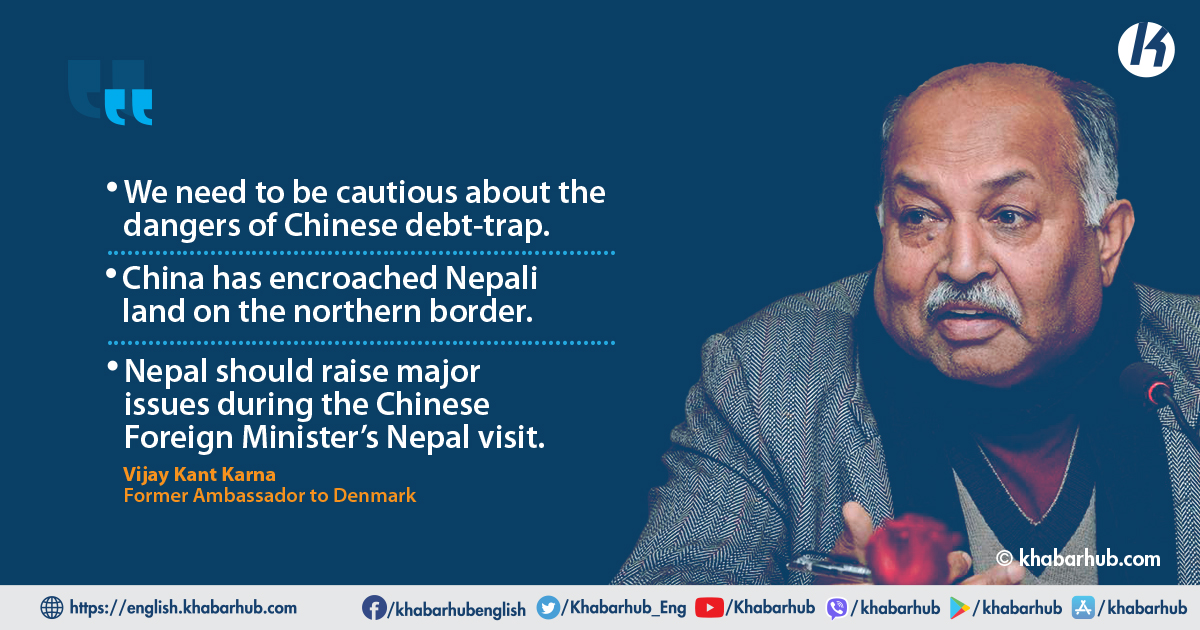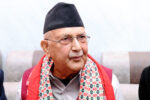Vijay Kant Karna, a professor at the Tribhuvan University, is a former Nepali Ambassador to Denmark. Also a former journalist, Karna prefers putting his views outright, particularly on politics, foreign affairs, and diplomacy.
In a conversation with Khabarhub, Prof. Karna talked about the upcoming visit of China’s Foreign Minister, Nepal-China relations, and issues that Nepal should raise during his visit. Excerpts:
How do you see the three-day visit of Chinese State Councilor and Foreign Minister Wang Yi to Nepal?
In fact, I take the visit in a positive light. Nepal and China are neighboring countries. In this context, the visit of a senior leader and a minister is appreciated.
But the context in which this visit is taking place is significant in itself. For the past few days, there have been some problems in the relations between Nepal and China.
Most importantly, the activities and role played by China in influencing the ratification of the US grant — Millennium Challenge Corporation (MCC) — should be understood as interference in Nepal’s internal affairs by using Nepali political parties.
In this regard, it would be a right gesture if the Chinese Foreign Minister during his visit to Nepal assured/convinced us that China would not interfere in Nepal’s internal matters anymore.
Secondly, for almost seven years now, China has imposed an undeclared blockade in some of the checkpoints in Nepal thus affecting the import of Chinese goods.
After the 2015 devastating earthquake, the Chinese side closed the Tatopani checkpoint in Sindhupalchowk district.
However, even after completing the repair and maintenance work from both sides, the checkpoint is still not open full-fledged. This has, therefore, violated the right of a land-locked country like Nepal to import and export the goods. The Rasuwagadi checkpoint has been closed for the past two years.
Meanwhile, over the years, China has also encroached upon some places in our northern border, particularly in Dolakha and Humla.
Six months ago, a committee formed to investigate the border dispute with China had submitted to the government saying some places have been encroached upon by the northern neighbor.
On the one hand, China has imposed a blockade on the border points, encroached upon Nepal’s land, and on the other, there has been political interference.
Amid all these, it’s high time that the Government of Nepal discussed this issue during the visit of China’s foreign minister. Both countries should resolve this issue peacefully through dialogue and diplomatic means.
What issues should Nepal raise during Wang’s visit?
Along with the issues that I mentioned above, the gap between Nepal and China is widening in terms of imports and exports. Our exports are completely halted.
The volume of imports from China is much higher than the volume of goods coming via India. We have a huge trade imbalance.
We also need to raise the issue of Chinese investment. China should be ready to take back the aircraft brought by Nepal Airlines some four or five years ago since these aircraft could not give service because of which Nepal has suffered a deficit of billions of rupees.
This is an important issue to be raised by the Nepali side. In 2017, we signed the Belt and Road Initiative (BRI) agreement with China, but so far no project has been implemented.
I have heard that Nepal and China are making a framework agreement to implement the projects. Therefore, while negotiating the loan agreement, it is important for Nepal to analyze the condition of Sri Lanka, Uganda, Kenya, Tanzania, and other African countries.
We need to be extremely cautious while accepting loans from China since it would be disastrous if we cannot repay them.
Another important aspect is that we can make the best use of the 1 billion US dollars given to Nepal by India during the visit of Indian Prime Minister Narendra Modi at a zero percent interest rate for 30 years.
We also need to ask for a concessional loan with China, and be able to say that Nepal will manage the projects itself.
Likewise, Nepal should also discuss the development model, the number of projects announced by the Chinese government, and the financing model of the projects announced by the President of China, among other issues.
Voices have been heard that there are several issues that Nepal has not been able to raise with China. What is your observation?
To refer to a source at the Ministry of Finance, I have heard that Nepal has not taken up the issue with China so far. There are issues such as the land encroachment issue in Humla, Tatopani check-point, Rasuwagadhi checkpoint, BRI, among other issues.
Unfortunately, for the past two and a half years, the Chinese Ambassador to Nepal has endeavored to jeopardize our relations with the United States. It is Nepal’s internal matter to maintain smooth relations with US and India. China should not dictate.
China’s interest might be its national security, curbing anti-China activities along the Nepal-China borders, but it tried to question the sovereignty of our parliament and the way Chinese leaders spoke about the MCC issue.
The Chinese side even tried to impress and intimidate Communist party leaders in Nepal. China endeavors to influence the parliament, and Nepali politics will not be acceptable at any cost. Nepal’s ministers, political leaders, and others should tell the Chinese foreign minister that these issues are in the national interest of Nepal.
They should be able to tell the Chinese minister that Nepal and China should remain as goods neighbors and friends, and that China should not take interest in Nepal’s internal affairs.
Chinese President Xi Jinping earlier said that he would help Nepal to become a “land-linked” country from a landlocked one. However, China has not yet opened the border points. How did this problem start?
In fact, it’s easy to say and difficult to implement. It needs seriousness. It’s been five years since we have signed the BRI agreement with China.
Despite this, the projects under the BRI have not been progressed. This is also due to our own weaknesses as we could not pile pressure on the Chinese side.
We need to think about how important Nepal’s development program is for China. We also look at how important Nepal’s trade is to China.
China did not show any seriousness on the issue. It seems that China has been trying to keep Nepal under the security umbrella rather than supporting Nepal’s development program.
Therefore, it is doubtful that China will carry out development projects in Nepal. Despite the Chinese president’s visit to Nepal, the Tatopani border point has not been fully functional.
Khabarhub consistently raised the issue of border encroachment in Humla. You also did some research. What are your findings?
Upon hearing Chief Minister Jeevan Bahadur Shahi’s viewpoints and the findings of his report, we also took the initiative to make a field study report. Locals there categorically said that the Chinese side had encroached upon Nepal’s land in the Hulma district.
Our security system is so weak that security forces are not present there. Similarly, the border has been fenced with barbed wire. China has erected an infrastructure on the Nepali side, according to the locals. This issue needs to be discussed during the Chinese Foreign Minister’s visit to Nepal.
China has barred Nepal from importing goods through the border areas. However, the Nepali side seems to be least ignorant on the issue. How do you look at it?
I am surprised why Nepal’s media is hesitating to raise the issue vehemently. The Rasuwagadi checkpoint was closed from January 2020.
After being closed for several days, only three or four containers of goods are allowed to enter Nepal. I wonder why no political leaders or media have raised the issue of re-routing around 900,000 containers of goods (stopped at the Rasuwagadhi) and bringing them to Nepal from Calcutta, India.
Nepali traders have been incurring loose in millions due to re-routing. A businessman doing business with China even committed suicide.
In fact, there has been a narrative in Nepal that China will do no wrong to Nepal. From the very beginning, ideologically, Nepal’s Left parties have been chanting the mantra of ‘American imperialism’ and ‘Indian expansionism’.
The mindset that we should not speak anything against China is itself erroneous. This is a big issue. China has imposed a trade embargo on us. Our two checkpoints are closed.
We have not been able to import and export goods from there. This is an injustice done to a landlocked nation. This issue should be clearly raised during the visit of the Chinese Foreign Minister.
Nepal is a member of the Belt and Road Initiative. BRI’s proposed projects have neither moved forward nor has Nepal taken any loan under it. Now, the issue of implementation of the agreement has come up again. What is your analysis?
As far as I know, it is a loan. And, if we really think of developing the country by seeking loans, the first thing we need to look at is whether the proposed projects have funds or not. We also need to see if others countries provide us loans at an interest rate of much less percentage than China.
If so, there is no need to take loans at higher interest rates. In fact, it was wrong to give the contract of Pokhara Airport to China.
Moreover, look at the aircraft that Nepal bought from China. I think, one of the major reasons why no agreement has been reached so far is that our finance ministry is not ready to take expensive loans. Look at Sri Lanka as an example.
The port built in Sri Lanka has only 15 percent utilization. Unable to repay the port’s loan and interest, it was handed over to China three years ago for 100 years.
The condition of Tanzania’s international airport is deplorable, and the same is with Kenya. We have not entered into such an agreement.
If you are unable to repay the loan, Nepal would face the same fate as Sri Lanka and Kenya. Nepal cannot afford this.
If we really want to implement the projects, then we should be able to ask for grants or aid. Otherwise, the World Bank, the Asian Development Bank and other donor countries would have to pay interest.
China has got many contracts for most of the major projects in Nepal. However, questions have been raised about the progress of the work. Why did it happen?
This is another important issue. After undertaking the Melamchi project for four or five years, the Chinese company fled. It had completed only 10 percent of the work. Nepal could not raise the issue with China.
This is also one of the reasons why Nepal’s projects are expensive. Due to the inability of Chinese companies to complete various projects such as hydropower and road construction, airport projects and other projects on time, the cost of the project will increase. The government should be able to warn the Chinese companies, and even black-list them.
It is also important to understand that this has to be implied with the Indian companies and the Indian government as well.
Similarly, the government should be able to implement its laws and rights when it comes to any US government or US company projects. It all depends on the close relationship with the United States. Nepal has failed somewhere in this regard.
The government of Nepal feels very weak because Chinese companies have taken advantage of the opportunity to play with a huge amount of money in Nepal.
Lastly, what are the issues to be considered when Nepal receives assistance, loans, grants, etc. from the international community?
First of all, we need to be able to prioritize the money we need. We should not take any loans. For instance, we have taken loans for the Tribhuvan University in various topics such as upgrading it.
However, the loans have gone up and there is a possibility of reaching it in the abyss. Similarly, we need to think beforehand whether we needed any projects or not. We need to prioritize and work out/plan accordingly.
We should have thought beforehand whether we needed the Pokhara Airport. The government should first analyze whether such projects will serve the interest of the people and the country or not.









Comment